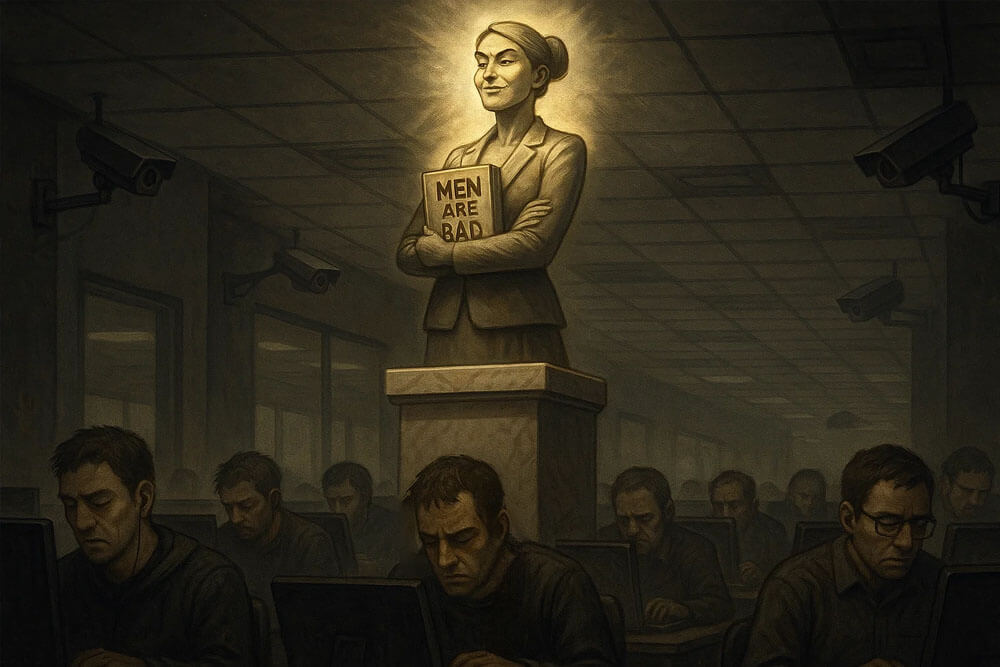Big Tech used to be about building. Now it’s about being seen. Watch any of the viral “day in the life” videos from female employees at Meta, Microsoft, or pre-Elon Twitter, and you’ll see the same pattern: boutique coffee bars, rooftop lunches, journaling sessions, yoga breaks, a quick sync call, and maybe a team outing to a wine bar—all packaged as a workday.
These women aren’t coders or architects. They’re not optimizing databases or shipping features. They’re what Charles Haywood calls the “utility-maximizers” of the corporate age: performative actors in a system designed not for profit, but for optics, comfort, and personal status.
“Large companies are not profit maximizers at all,” Haywood writes. “They are designed to maximize the utility of their managers.”
That utility includes “minimizing the amount of work they have to do; advancing other people in their circle; or promoting the ideological goals that give them meaning.”
This regime disproportionately favors non-technical women in roles like HR, DEI, internal comms, and “employee experience.” These aren’t jobs that build anything. They’re jobs that curate the feeling of building something. Their value isn’t measured in product output—it’s measured in presence, narrative, and optics.
The Truman Show Economy
To outsiders, these roles look absurd. To insiders, they feel profound. For many of these performative employees, the tech office isn’t a job—it’s the Truman Show: a curated set filled with kombucha bars, gratitude circles, and Slack affirmations, where the illusion of contribution replaces real creation. Everyone claps, everyone feels seen, and nothing meaningful gets done.

But this illusion doesn’t end at 5 PM.
Work as Wellness: A Lifestyle on the Company Dime
The daycare now extends far beyond the office walls. Companies fund “female empowerment” dinners, wine tastings, vision board workshops, and full-blown spa retreats—all billed to the company as culture or team building. These aren’t rare perks. They’re recurring rituals in HR-driven tech firms, designed to cultivate sisterhood, emotional validation, and lifestyle therapy—without requiring real performance.
This isn’t work. It’s a curated identity experience subsidized by shareholders.
Wellness at $170,000 a Year
According to public compensation data, an “Employee Experience Manager” at Meta costs the company north of $150,000 in base pay, equity, and perks. That’s nearly $700 per day—for journaling prompts and catered gratitude circles. Meanwhile, a mid-level backend engineer earning the same burns through tickets, optimizes load time, and keeps the product alive. The delta isn’t just inefficiency. It’s theft disguised as culture.
The Potemkin Corporation
Behind the self-care slogans and pastel Slack emojis lies a rotting foundation. HR and ESG—two internal power centers—have turned the modern firm into a Potemkin Village: all façade, no function.
HR has morphed from a back-office function into the company’s moral enforcement arm. It invents roles around emotional wellness, identity, and “psychological safety.” It hires for optics. It shields underperformers from accountability by labeling criticism as “harassment.”
ESG (Environmental, Social, and Governance) ratings—pushed by mega-funds like BlackRock—reward companies for identity quotas, not innovation. They measure compliance, not competence. Hiring for talent is risky. Hiring for optics gets you a bonus.
Every year, tens of millions are burned on ESG compliance: quota hiring software, bias auditors, and DEI PR firms. That same capital could fully fund dozens of A-round startups—the next Stripe, Shopify, or Snowflake. Instead, it funds Napa wine tastings under the banner of “team cohesion.”
And now, as backlash grows, we’re entering the next phase: rebranding.
Major firms like Microsoft and JPMorgan are quietly folding DEI departments into HR, renaming them “Culture & Belonging” or “Inclusive Experience.” They’re not eliminating the ideology. They’re laundering it under softer names.
The daycare isn’t closing. It’s just updating the signage.
Privilege in Yoga Pants
These roles aren’t just unproductive—they’re decadent. They exist because a certain class of people, overwhelmingly white women, have become the most materially privileged group in human history. No other group has been given so much institutional support, moral deference, or economic padding while being asked to contribute so little.

They didn’t break the glass ceiling—they replaced it with a skylight and an in-house barista.
Adult daycare jobs aren’t an accident. They’re the natural byproduct of a culture that rewards identity over output. This is not empowerment. It’s aristocracy in yoga pants.
Slack Leaks and Exit Interviews Tell the Truth
Behind the public messaging lies the reality visible in internal Slack threads and exit interviews.
“Can we push retro until after the lunar eclipse? I’m spiritually raw today.”
“It really hurt when our manager questioned my productivity in front of the team. That wasn’t inclusive.”
These aren’t satire. They’re calendar items. Engineers fleeing the scene are beginning to speak up.
“I left when 40% of sprint retros were about microaggressions and pronouns.”
That’s not resignation. That’s escape.
Who’s Locked Out?
And who gets excluded from all this curated self-actualization?
The very men who once built the infrastructure.
Talented, technically-minded young men—especially white men—are quietly told not to bother. They’re too risky for the optics game. Too uncompliant for HR. Too competent for the rituals of performative work. The message is clear: this place isn’t for you anymore.

Imagine if the same standards were applied to male-dominated teams in operations or engineering. They’d be gutted by Q2. But in HR and DEI, mediocrity is protected—so long as it checks the right demographic boxes.
Diversity doesn’t mean everyone gets a seat. It means white men get theirs pulled.
The Men Who Gave It Away
None of this would have been possible without a specific kind of man: the guilt-ridden Boomer executive and the woke Millennial middle manager.
The Boomers—flush with the spoils of real innovation—felt guilty about their success. They confused generosity with surrender, handing over power to HR, DEI officers, and corporate activists in the name of progress. Rather than defend the cultures that worked, they apologized for them. They mistook appeasement for leadership.

The Millennials, raised in a post-9/11, postmodern, university-driven regime of fragility and social justice, brought with them an entirely different value set: emotion over logic, identity over merit, safety over challenge. They didn’t seize power—they were handed the keys by Boomer mentors desperate to prove they weren’t sexist or racist or mean.
And thus the torch was passed—from the men who built the engine to the women who decorate the lobby. The tragedy is not just that these men failed to gatekeep. It’s that they convinced themselves it was virtuous not to.
Conclusion: The Real Cost
This isn’t just about pampered tech workers or viral TikToks. It’s about a civilizational shift—from building things to performing identity. From risk-taking to ritual. From merit to managed optics.
The real builders—engineers, designers, creatives—are demoralized, undercut, and leaving. Product quality suffers. Innovation slows. Entire companies begin to resemble their Slack channels: bloated, self-referential, and obsessed with feelings.
Eventually, the systems these actors inherited will break—because reality doesn’t care how inclusive your Slack thread is.
The question isn’t whether Big Tech is dying. It’s whether anyone still has the courage to fire the daycare staff, bolt the gates shut, and rebuild the forge.
—Wolfshead






Oh my, your article triggered me and caused me emotional distress to the point of physical discomfort!
Sorry, I could not resist. But these coffee-slurping yoga wenches rub me so much the wrong way, I hate the type with a fiery passion.
I love coffee, but they really give it a bad taste. The legions of photos of scantily clad or dreamy looking, absolutely doing nothing but stylish looking women really make my coffee cream go sour when I just think for a moment about them.
It is all show, they do nothing or harm the company. The worst is that they are indeed often not just in nonsense positions but in HR, where they can maximize their negative impact on the company by preferably hiring wimps, losers and weaklings. They won’t hire a male opposing them slightly.
The image you picked, the downtrodden males overseen by a smug woman, it’s all too true. Similar case is that of a Turkish HR lady hiring and replacing people with relatives, foreigners and think-alike people, literally driving my engineer friend, former husband of my aunt, away and ruining the whole company over a decade.
These annoying and awful yoga wenches also love to look down on women doing traditional female work: nurses, veterinaries, shop assistents, cashiers. Interestingly dental assistants seem excluded from the scorn, maybe they do less actual work than nurses, no idea.
If one of these women “ends up” as a housewife, you can see a comedy of being a mother. The mum diaries of them being the powerful, thoughtful and loving care taker and MANAGER of the whole family with regular display of yoga, meditation etc. exercises… it is hilarious.
These women are dangerous. They are often not just useless, but destructive and dangerous.
I agree 100% with you. Women are a cancer in the workplace. White progressive women are the most privileged women in human history. Their nature is conducive for being at home raising children, making food, and taking care of the household. I’m not kidding. Our ancestors knew God intended a sacred division of labor.
Nobody likes working with women — even other women! Read the comments in the videos I’ve linked.
Men are afraid to be alone with a woman in today’s workplace because one false accusation will ruin a man’s life and all he’s worked for.
P.S. I added a new section and improved the conclusion.